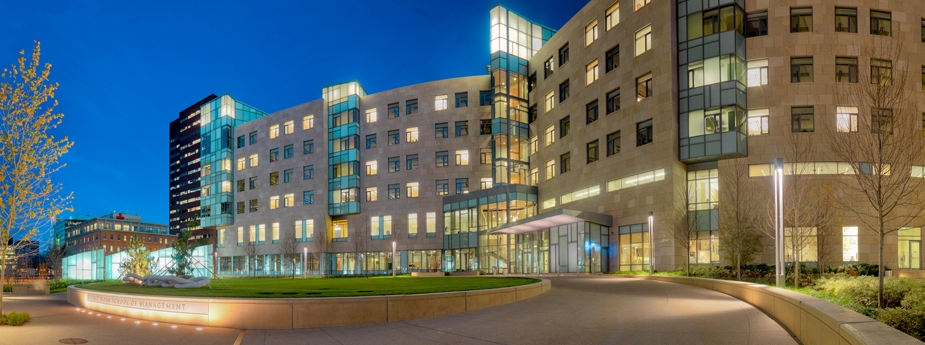
Photograph by Mario Tama/Getty Images
(Corrects description of the student visa option described in eleventh paragraph. )
Students from abroad who study at U.S. business schools often struggle when it’s time to land a job. Increasingly, B-schools set aside resources to help this group overcome a pair of career obstacles: the difficulty of getting legal permission to work in the U.S. and cultural differences that can make navigating the American job market difficult.
In 2012, around 13 percent of the 472,000 students enrolled in U.S. business schools were from other countries, according to the U.S. Department of Education. Schools have a lot of reasons to love foreign students. For one thing, they’re likely to pay the full cost of nonresident tuition, since they’re generally not eligible for federal aid. They also make a student body more diverse by some measures, a statistic business schools consistently struggle to improve. “International students are a terrific resource: They are independent and bring a lot to our program,” says Karen Dowd, assistant dean of career management at Simon Business School at the University of Rochester.
But these short-term immigrants, largely from China, India, and South Korea, according to a report by the Institute of International Education, a research and training organization, might offer top U.S. B-schools a bigger benefit than they take away. Of the students who come to the U.S. for business school, 87 percent hope to use their MBAs to get jobs in the country they studied in, according to the Graduate Management Admissions Council. Many will be disappointed. International MBAs most commonly go after an H-1B visa, which are limited to 65,000 per year for the general population, plus an additional 20,000 for those with U.S. advanced degrees. This year, roughly half of all H-1B visa applications were rejected, according to U.S. Citizenship and Immigration Services, a division of the Department of Homeland Security.
Before the battle for these scarce visas begins, international students first need to pass muster with an employer. Doing that means learning the vagaries of the U.S. job market, where individualism trumps collectivism and students are expected to work just as hard at rustling up interviews as they do in class.
Students who are used to a more formal professional environment can seem robotic to American employers, says Judy Shen-Filerman, a consultant who works with universities to help their international students succeed in the U.S.
“They feel uncomfortable [sharing] personal stories and have a missing link with their confidence,” said Cheri Paulson, director of the Graduate Center for Career Development at Babson College’s Olin Graduate School of Business.
Encouraging students from outside the U.S. to work the recruiting circuit presents its own challenges. In some Asian countries, “one’s future potential is inextricably tied to academic success,” says Shen-Filerman. If they assume their grades will speak for them, they might not be prepared to impress employers.
Many have to get comfortable about bragging about their accomplishments, something that doesn’t come naturally for students from South Korea, Saudi Arabia, and certain Latin American countries, where it is considered uncouth to praise yourself, says Shen-Filerman. She drills individualism into students, reminding them: “I’m visible, I’m credible, and I can make a difference.”
These issues haven’t gone unnoticed by schools, which rely on strong job-placement statistics to attract students. Many have implemented programs or hired staff that help bridge the cultural gap. The Simon Business School at University of Rochester, which has one of the highest rates of international students among the U.S. MBA programs Bloomberg Businessweek ranks, at 63 percent, has a cultural liaison on staff who teaches students about personal branding and communication.
The cultural counseling starts early at many schools. The Sloan School of Management at MIT, the Merage School of Business at UC Irvine, the Goizueta Business School at Emory University, and others offer a special international-student orientation week to give non-U.S. students a head start bridging this gap.The University of Washington’s Foster School of Business, where 41 percent of MBA students are international, has a special two-day career development training for 15 to 20 Chinese students in Shanghai a few weeks before classes start.
Yet schools and consultants still recommend a backup plan for even the most culturally adapted transplants, such as seeking out multinational corporations. Optional Practical Training (OPT), a privilege attached to the F-1, or student visa, allows international students to work in the U.S. for one year, then transfer to an office abroad if they aren’t able to stay in the country.
Boston University’s School of Management suggests foreign-born students run a dual job search, in the U.S. and their home countries, to make sure they are employed after graduation, says J.P. Matychak, the school’s assistant dean for career services. The odds, he says, are stacked against them. “International students face an uphill battle when getting jobs in the U.S., from lack of visas to employers unwilling to take a risk.”
取得文憑只是第一關,美商學院外籍生就業之路困難重重 |
作者 林 薏茹 | 發布日期 2014 年 08 月 11 日 | 分類 人力資源 |
在美國大學商學院求學的外籍學生,儘管有名校商學院學士畢業的學歷,或 MBA 的光環加持,非本地人的身分依舊讓他們少了些優勢,導致畢業後求職困難重重。除了取得美國合法工作證有一定的難度外,求職中面臨的文化差異,對外籍生來說也是一大問題,於是,近年來美國商學院開始運用資源,幫助這些學生克服職涯阻礙。
根據美國教育部統計,2012 年美國商學院的 47 萬 2 千名新生中,約有 13% 是外籍生。美國大學之所以喜歡錄取外國學生的原因很多,像是:就讀該大學商學院的非本州居民必須付 1 年的「非本州居民學費」,但不符合補助標準的外籍生則是就讀大學 4 年間,都必須支付全額學費。此外,這些外籍生大多來自中國、印度與南韓,他們的加入也讓商學院學生結構更加多元。
研究生管理入學委員會(Graduate Management Admissions Council)調查指出,到美國就讀商學院的國際學生中,87% 希望能以 MBA 學位在當地找到工作,但能找到理想工作的只有少數幸運者。
國際學生求職阻礙──缺乏「個人色彩」
國際學生畢業後若想留在美國就業,在申請工作簽證前,必須先通過雇主那關。意味著外籍生得在美國求職市場先經過一番苦戰,而在這戰場中,相較於團隊表現,雇主更重視個人色彩,但這往往是外籍生最缺乏的特質。
許多美國學生擅於自我推薦,且不吝於對他人誇讚自己,但對來自南韓、沙烏地阿拉伯或某些拉美國家的學生來說,謙虛才是在社會長久生存的上策,稱讚自己反而是種無禮的表現,也因此,外籍生求職時,常會讓雇主覺得在他們眼中似乎看不到自信,偏偏這對重視個人表現的美國企業來說相當重要,錄取機率相對也就降低許多。
國際學生文化顧問 Judy Shen-Filerman 為替外籍生建立「個人主義」色彩,常要他們提醒自己:「我是可靠的,我的實力會被看見,而且我一定能成就一番大事」。
(圖片來源:Islamic Renaissance)
學科成績高,不代表在美求職之路順遂
外籍生除了個人色彩不夠濃厚外,Shen-Filerman 也提到,在某些亞洲國家的觀念裡,認為「一個人未來的潛力,與他的學歷密切相關」,但從美國企業的角度來看,其實不盡然如此。
高學科成績不代表你的實力,若只在乎成績單上的漂亮數字,而忽略精進自己學科外的能力,對企業來說不過是個書呆子罷了,不太可能在面試戰場上成功贏得雇主目光。
工作簽證難申請,想好備案以免兩頭空
假如外籍生幸運的在求職場上,擊敗各家好手,拿到理想工作的門票,接下來就必須面對另一個關卡了──申請 H-1B 工作簽證,但這種簽證一年只簽核 6 萬 5 千人,另外開放 2 萬個名額給擁有美國碩博士學位的學生,僧多粥少的情況下,今年申請 H-1B 工作簽證的學生中,約有一半的人被打回票。
為了改善國際學生的文化差異問題,減少求職過程中遇到的阻礙,許多學校開始採取措施,聘請國際學生文化顧問,並針對非美裔學生特別規劃新生訓練周,如麻省理工學院的史隆管理學院(the Sloan School of Management at MIT)、加州大學爾灣分校商學院(the Merage School of Business at UC Irvine)、艾默里大學戈伊蘇埃塔商學院(the Goizueta Business School at Emory University)、羅徹斯特大學的西蒙商學院(The Simon Business School at University of Rochester)等。
▲圖為麻省理工學院的史隆管理學院。(圖片來源:MITSloan)
許多顧問甚至建議學生,既然待在美國當地的就業之門狹窄,不妨尋找跨國公司的工作機會,如此一來,外籍生可選擇申請能留在美國工作一年的美國學生實習簽證(Optional Practical Training,OPT),先拿到暫時的入場券,再看看能不能在一年時間內,成功申請到 H-1B 工作簽證。假如最後依然無法拿到美國工作簽證,至少還能申請轉調公司在其他國家的分部。
波士頓大學管理學院(Boston University’s School of Management)則建議外籍生,可同時在美國及自己的國家找工作,確保畢業後就能直接就業,畢竟國際學生在美國求職,通常得面臨一番苦戰,幸運的克服文化差異,贏得雇主青睞固然令人欣喜,但若簽證遲遲無法到手,一切也只是徒勞無功,不如在兩地求職場上同時起跑,才不會落得兩頭空。
然而,許多人之所以選擇去美國商學院求學,無非是認為在自己國家無法找到理想工作,想去美國尋求新機會,取得文憑後,直接在當地就業。對他們而言,波士頓大學請他們回自己國家求職的建議,讓人不禁想起了晉惠帝曾說的:「何不食肉糜?」
(首圖來源:search job abroad)


沒有留言:
張貼留言